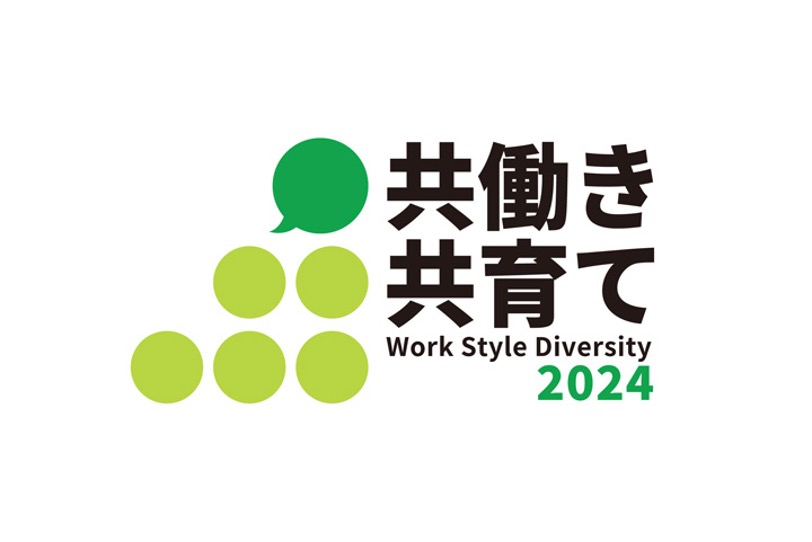Sustainability
Diversity and Inclusion
Basic Approach
The policy of the NGK Group is to provide stable and equal employment opportunities to people possessing a diverse range of attributes, regardless of race, national origins, gender, sexual orientation and gender identity, age, religion, belief, existence of disabilities or any other aspect. We promote even greater efforts to achieve diversity through educational activities to support work-life balance, employ people with disabilities, and advance understanding of diversity and inclusion. In addition to this, we also maintain an environment that enables diverse human resources to enjoy a wide range of work styles by utilizing telecommuting, providing other flexible work styles, and offering a wide range of career paths that each employee can pursue individually, according to personal inclination, suitability, and type of work.
Approach to Local Hiring
Of the roughly 12,000 employees at NGK Group sites outside of Japan, more than 98% were hired locally. We recognize that it is the responsibility of companies that operate in each country and region to contribute to the development of the local economy and society, to and actively hire local people at each of our sites.
Framework to Promote Diversity and Inclusion
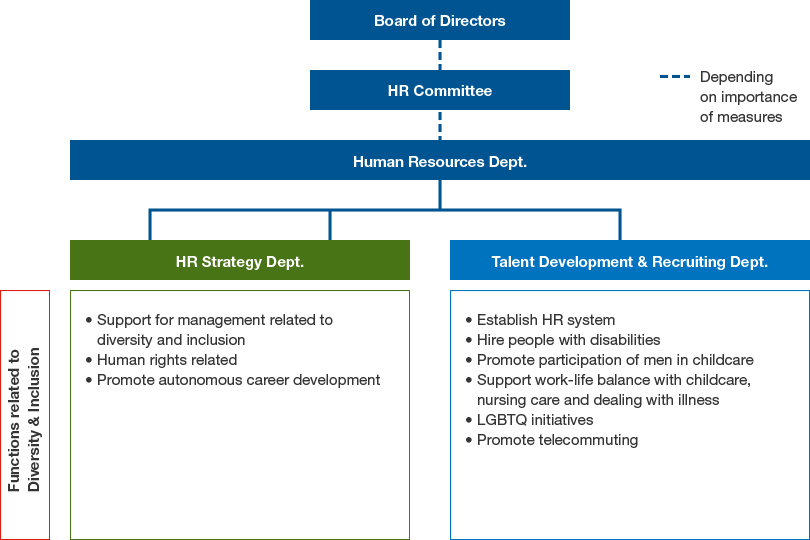
Systems and Initiatives to Support the Active Participation of Diverse Personnel
NGK is promoting various measures for personnel transfer, career development, follow-up, support for early return from leave, flexible work styles, and the like, to create an environment that makes it possible for employees to take full advantage of their individuality and skills in various aspects and situations.
Human Resource Utilization Systems Aligned with Employee Individuality and Skills
To open the way for employees to take full advantage of their individuality and skills, NGK adopts an internal job application system in which open positions are announced internally and eligible applicants are appointed. There is also an FA (free agent) system that allows employees to register their personal aspirations and preference of jobs within the company.
Starting in FY2025, we have established a new in-house scouting system by which employees are directly scouted by other departments for management roles, and are given the opportunity to advance in the selection process on their own accord.
Internal Job Application System
System for the Regular Appointment of Fixed-Term Manufacturing Contract Employees
NGK established a system for appointing fixed-term manufacturing contract employees to regular employment, and 13 employees were appointed in FY2024.
Appointment from Fixed-Term Contract Manufacturing Workers to Regular Employees
Operating Follow-up System to Fit Young Employees in the Workplace
We follow up on younger employees in different ways after they have been placed. We conduct surveys for career-track and production engineering employees about their jobs and work environment during their second year of employment. We then conduct interviews with all production engineering employees, and any career-track employees who so desire, and the head of each department provides feedback to those who want it.
Initiatives for Employees to Chart Their Own Career Path
Concept
Since 2021 NGK has been implementing initiatives under our employee Career Autonomy policy.
Policy
Support autonomous career development within the company
Career Autonomy E-Learning
Since FY2022, we have conducted e-learning aimed at all employees, and more than 4,000 employees have participated thus far. They studied the following topics as the basic knowledge necessary for thinking about their own career independently.
- Career ownership and careers in an era of 100-year life expectancy
- How to approach your career (two types/two aspects/three factors)
- Things that are necessary for enhancing your career (Will/Can/Must)
- Career plan concept
Career Planning Training for Third-Year Regular-Position Employees
Once employees have been with NGK for three years, we ask them to reflect on their growth over the last few years and think about how they will approach internal staff rotation from their fourth year onward. Our goal has been to support them in creating a concrete action plan towards this end. This has become an opportunity for employees to think about their career going forward through group discussion with more senior employees who have experience with rotation. Once the training is complete, participants also meet with their supervisors to share their career plan.
Career Planning and Leadership Training for Newly Promoted Employees
We provided career planning and leadership training for newly promoted employees. The purpose of this training was to deepen employees’ self-understanding and to promote career planning as an opportunity to think about future work styles as they are undergoing a career change such as a promotion. Participants prepare to start a new path as human resources who can fulfill their roles by learning about the expectations in them, the concept of the career necessary for their roles and knowledge in this training. Moreover, we provided this training among those promoted to the supervisor class in the same fiscal year. The aim of this was to allow participants to acquire the necessary practical communication skills to lead their teams.
Career Design Seminar for Employees in their 40’s and 50’s
We held a Career Design Seminar for Employees in their 40’s and 50’s targeting key personnel and general employees. We ask participants to reflect on their own past and present in order to maintain motivation and work with energy. Through work and discussion, they confirm their own characteristics, abilities, and values in search of a proactive work style that suits them and will allow them to prepare for future changes in their environment. Participants have told us that they deepened their understanding of their own characteristics and values and that it gave them an opportunity to think about their lifetime career.
Career Consultation Helpdesk
At the helpdesk, certified career consultants provide career formation support and consultation services to employees, while strictly observing confidentiality. In FY2022, we established a helpdesk which also allows employees to consult with external career consultants.
Come-Back System
Since FY2016, NGK has had its Come-Back System to rehire people who had left our company for various reasons (e.g., job change, studying abroad, job transfer of a spouse, etc.) as mid-career employees. As of FY2024, there have been three employees rehired through the Come-Back System.
Conducting E-learning to Promote the Active Participation of Women
Women’s active participation e-learning was carried out in FY2020 with the aim of promoting proper understanding and cooperation among all employees and not just a targeted segment of participants. Easy-to-understand videos were streamed, which featured messages aimed at female employees, supervisors, and colleagues and which sought to raise awareness about unconscious bias and other topics.
New Initiatives for Achieving Our Action Plan for Promoting Women’s Active Workplace Participation (MHLW)
In March 2023 in accordance with the Act on Advancement of Measures to Support Raising Next-Generation Children and the Promotion of Women’s Participation and Advancement in the Workplace, NGK submitted a general employer action plan to the Aichi Labor Bureau, which is overseen by the Ministry of Health, Labour and Welfare (MHLW).
Ministry of Health, Labour and Welfare: General Employer Action Plan
Purpose
We will promote the enhancement of the work-life balance starting with the participation of men in childcare. We will create an employment environment where all our employees can demonstrate their abilities to the maximum possible extent. In addition, we have formulated the following action plan with the aim of increasing the number of women in managerial positions by taking initiatives relating to the advancement of women in the workplace.
Period of the Plan
April 1, 2023 to March 31, 2026
Target 1: Take-up rate of childcare leave* by male employees of 100% [Next-generation and Female Advancement]
This is the take-up rate of long-term childcare leave and leave for childcare purposes
Details of the initiative:
- We will instill within our company the promotion of male childcare by our top management with our declaration to achieve 100% of eligible male employees taking childcare leave (2023).
- We will improve our Intranet to make it even more informative and easier to use. Moreover, we will publish introductions to male employees on childcare leave on the Intranet. That will allow employees to feel more familiar with male childcare leave (2024).
- We will ascertain the actual number of male employees taking childcare leave. We will then consider and implement the measures necessary (from 2025).
Target 2: Reduce total working hours to enhance the work-life balance of all employees [Next-generation]
Details of the initiative:
- We will hold no-overtime days.
- Top management within the company will make family-friendly boss declarations.
- Labor and management will regularly exchange opinions about overtime hours and the paid leave take-up rate.
- We will strive to encourage employees to take leave and to change employee’s awareness toward leave to raise the number of employees taking paid leave. We will achieve these aims by creating a workplace environment where it is easy to take leave and by raising awareness among both those in managerial positions and employees.
- We will set upper limits for overtime hours by department. If we anticipate those limits will be exceeded, labor and management will hold talks to analyze the causes and to consider measures to reduce long working hours.
Target 3: Raise the ratio of women in managerial positions to 5% [Female Advancement]
Details of the initiative:
- We will increase the ratio of women among new graduate recruits to 40% for sales and management-related and 20% for engineering-related (from 2023).
- We will place half of new graduate female employees to business groups because the placement of female employees is biased toward headquarters and research departments (from 2023).
- We will provide seminars after employees return to work from childcare leave (ongoing program).
- We will introduce training to develop women who have converted to career-track positions into senior staff level (2024).
Number of Key Personnel (Managers)
NGK is aiming to increase the rate of female managers from 4% in FY2024 to about 10% by 2030 and to more than 20% by 2050.
Number of female key personnel (managers) as of March 31, 2025
Supporting the Active Participation of Diverse Personnel
LGBTQ Initiatives
In order to promote understanding of sexual minorities such as LGBTQ for the sake of fostering greater diversity in workplace participation, we provide education and hold awareness raising activities such as video-based training for employees. In FY2021, we began working to allow same-sex partners recognized by External Partner Organizations to utilize our internal service and benefit program.
Employment of People with Disabilities
NGK undertakes a variety of initiatives aimed at employing people with disabilities, such as accepting students from special-needs schools as trainees, and a framework for employing people with disabilities. NGK hired one mid-career employee in FY2024. In addition, nine new employees have been hired by NGK YU-SERVICE CO., LTD., which is our special subsidiary for promoting the employment of those with disabilities. These hiring activities led to a hiring rate of 2.83% as of the end of FY2024.
NGK YU-SERVICE CO., LTD. was awarded the grand prize in the 2024 Nagoya City Award for Excellence in Employment of Persons with Disabilities.
The NGK Group recruits people with disabilities according to their skills and the characteristics of each business to work at our special subsidiary and other companies in and outside Japan. Such employees receive reasonable accommodations and serve actively as members of the Group. Going forward we will expand our efforts to employ people with disabilities.
Systems and Initiatives to Support Diverse Working Styles
Promoting Work-Life Balance
NGK strives to promote a work-life balance and reduce long working hours.
We keep track of social changes, such as changing attitudes toward work as well as legislative amendments, and strive to respond to these changes flexibly and properly by improving systems and revising operations.
8 rules for promoting work-life balance
- No more than 70 hours of overtime work per month
- Overtime work exceeding 45 hours per month limited to six months each year
- Employees must take a minimum of 10 days of annual paid leave a year
- No more than 300 hours of overtime work per six months
- In principle, there will be no overtime work on refresh days (Wednesdays and Fridays)
If overtime is necessary, a prior permit application must be submitted - In principle, work must not be performed for more than seven days straight
If work in excess of seven days straight is necessary, a prior permit application must be submitted - Written applications must be submitted in advance when requesting employees to work on holidays or late at night
- There must be an interval period of at least 10 hours between shifts of late-night work
Initiatives to Shorten Total Hours Worked
Health Management: Initiatives to Shorten Total Hours Worked
Initiatives to Promote Use of Paid Leave
In FY2024, we revised our system to make it easier for employees who have been working for fewer years to take paid leave. We also increased the number of paid leave days to 20 days* for both new and experienced employees.
We set the minimum number of paid leave days to be taken by all employees at 10, and worked to increase the number of paid leave days taken.
Hereafter, we will continually implement initiatives to promote a good work-life balance.
Adjusted based on the month an employee entered the company
Paid Leave: Number of Days Used, Utilization Rate (NGK Union members; excluding outside employees temporarily assigned to NGK)
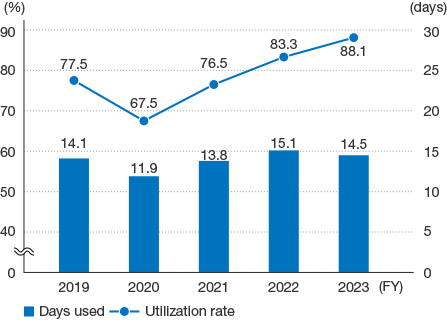
Establishing a Diverse Work-Style Support Website on Our Company Intranet
We have a site on diverse work styles on the company intranet to widely announce our measures to support a work-life balance. This site’s user-friendly features include, for example, an online handbook on childcare and nursing care.
Initiatives to Support Work-Life Balance
NGK offers flexible systems to help employees maintain a balance between work and family life. To support childcare and nursing care, we are enhancing financial support by providing a babysitter expense subsidy system, and a lump-sum payment system for nursing care support. And in consideration of the working environment, we offer support through shortened working hours, flex time, and remote work. Further, we continue to enhance the soft infrastructure NGK has in place to support these employees. For employees seeking to balance their career with childcare, we offer pre-maternity leave interviews, pre-reinstatement interviews during the long-term childcare leave period, career consultations, and other consultation resources. For employees undertaking nursing care, we offer nursing care-related information sessions and distribute nursing care handbooks, as well as facilitate consultation services which make use of outside specialist organizations.
Enhancement of Work-Life Balance Systems
NGK has been expanding our work-life balance systems while taking the needs of employees into consideration. Thanks to initiatives such as these, over 90% of male employees* took childcare leave in FY2024.
Total percentage of male workers whose spouses gave birth in the fiscal year preceding disclosure, who took long-term childcare leave or used leave for childcare purposes that year. (fiscal year: April 1, 2024 to March 31, 2025)
| 2010 | Significant revisions to personnel system |
|---|---|
| 2017 | NGK established a new early reinstatement lump-sum system for employees who return to work early from childcare leave following maternity leave (before the child turns 11 months old). We also started a non-registered daycare subsidy system to partially cover the cost of non-registered daycare centers, and began initiatives to provide career support to employees after they return to work. And, in addition to childcare and nursing care, we have established a system that allows for flexible work styles so that employees with illnesses which require repeated or continuous treatment can balance treatment and work without having to resign. |
| 2018 | NGK encouraged employees to exercise their abilities and achieve work-life balance by providing flexible work styles and environments, unconstrained by time or place. We also promoted the development of a work environment that boosts operational efficiency and productivity. In concrete terms, this meant considering and expanding telecommuting options. |
| 2019 | NGK introduced postpartum support leave for male employees. Employees can use accumulated leave (expired annual paid leave from previous years) instead of paid leave, and it can be taken in day-by-day increments which do not need to be consecutive. This has led to more male employees taking childcare leave than before the system was introduced. |
| 2020 | NGK officially introduced a telecommuting system to increase productivity and help balance work with childcare. |
| 2022 | NGK increased our special paid leave, for when a spouse gives birth, from two days to five days. We also included an explanation of the system for both those who will give birth and those who have a spouse who is scheduled to give birth in the Handbook to Support the Balance of Work and Childcare and on our internal website. And we established a point of contact for consultations relating to work-life balance to reduce anxieties among employees. Moreover, we have made it obligatory to hold an interview using the Request Sheet for Scheduled Childcare Leave. We held a talk for managers on the theme of Promoting the Take-up of Childcare Leave by Male Employees in NGK (FY2021). In addition, we informed all employees about the key points on the revisions to the Child Care and Family Care Leave Act and the changes to the operation of the system. As a countermeasure against the "first grade wall" [whereby mothers often quit their jobs when their children enter elementary school] we introduced a five-hour working day. This is even shorter than our previous reduced working hours. We increased the period of time in which parents can utilize reduced working hours, from until the child enters the fourth grade, to until the child graduates from junior high school. |
| 2023 | NGK created a guidebook for employees who are pregnant or have given birth, employees who have stated their spouse is pregnant or has given birth, and their supervisors. We also posted examples of best practices within NGK taken from our Questionnaire on the Division of Duties When a Subordinate Takes Childcare Leave to our website. |
| 2024 | NGK conducted online training for employees returning from childcare leave and their supervisors. Since the number of male employees taking childcare leave has increased, we split the Handbook to Support the Balance of Work and Childcare into versions targeting men and women, made the complex system of childcare leave for male employees easier to understand, and changed it to support system utilization. We expanded the period and number of days of accumulated leave that can be used for childcare*, and also expanded the scope of Sick/Injured Childcare Leave to greater than that required by law (up until March 31st of the child’s sixth grade year of elementary school)*. We eliminated the limit on the number of times that employees can utilize partial telecommuting, which combines office and remote work. For nursing care, we set up an internal website where we post related information so that employees can get timely access to information*. |
These systems went into operation in April 2025.
System to Support Employees to Balance Work and Childcare at Each Stage
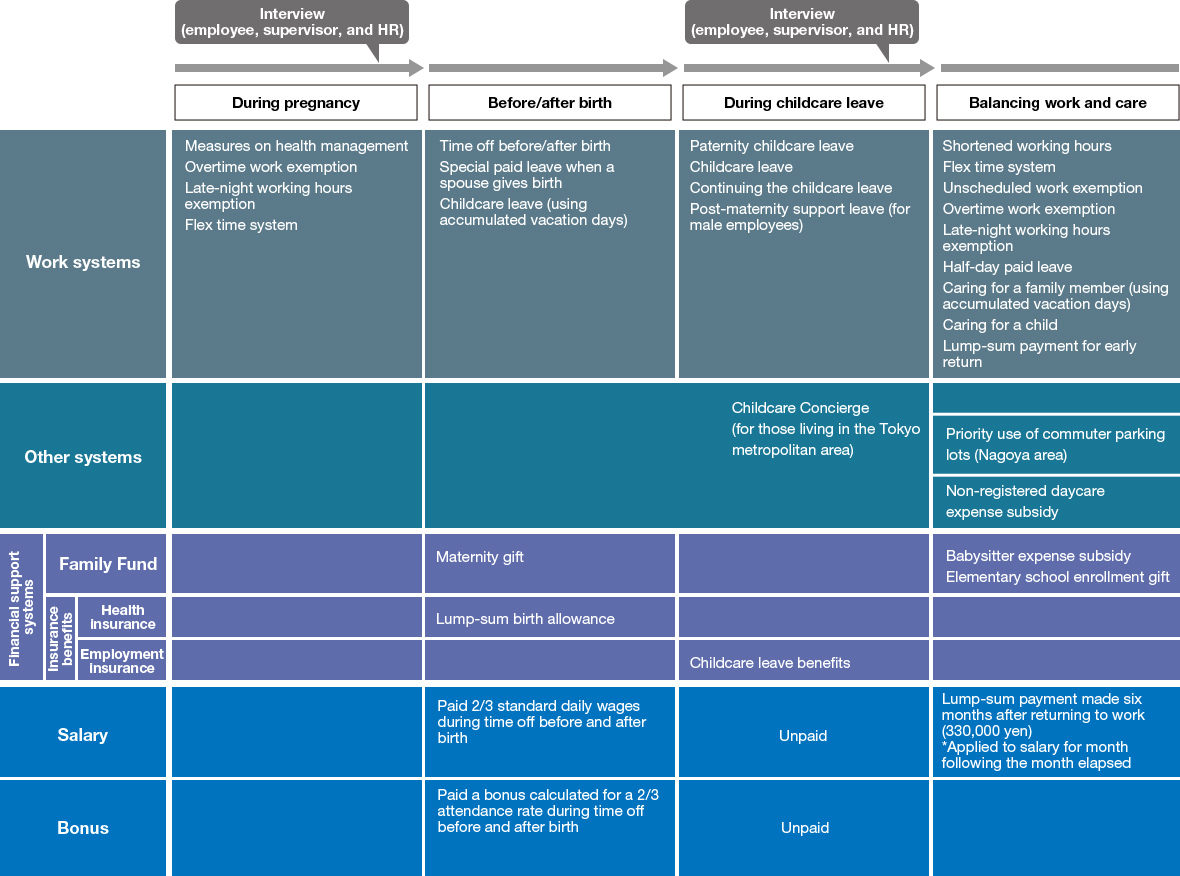
Systems to Support Early Return from Parental Leave
NGK has systems to encourage and support employees who have taken maternity and childcare leave so that they can return to their careers at an early stage.
These systems are aimed at developing workplaces that support female employees in particular, with the expectation of promoting their active participation.
Systems to Support Early Return from Parental Leave
- Lump-sum payment for early return
- Non-registered daycare center expense subsidy
- Childcare Concierge
- Five-hour shifts
- Paid leave provided to employees who return early from parental leave
- Measures to promote the use of telecommuting
Overview of Childcare Support Measures and Users
Systems beyond Legal Requirements
| System Name | Details of the System |
|---|---|
| Childcare leave | Can be utilized until the day on which the employee’s child reaches one year old in principle. When there are certain circumstances, such as not being able to get into a daycare center, leave is available until the child turns two years old.
It is possible to use accumulated leave (expired paid leave from previous years). |
| Shortened working hours | Six or seven hours per day for employees until the fiscal year when their children start fourth grade in elementary school. |
NGK Unique System
| System Name | Details of the System |
|---|---|
| Return to work after childbirth lump-sum payment | Lump-sum payment is paid six months after returning to work from maternity leave and childcare leave |
| System for annual paid leave in hourly increments (for employees working shortened hours) | Paid leave (five days a year) can be taken in hourly increments by employees working shortened hours |
| Postpartum support leave | It is possible to use accumulated leave (expired paid leave from previous years) for leave for childcare purposes |
| Pre-maternity leave interview | Interview is attended by employee, HR, and supervisor to provide the employee with peace of mind while on maternity leave and ensures both sides have proper understanding of procedures related to systems supporting childcare and work (it is also possible for the spouse to attend in the case of marriage between NGK employees) |
| Interview before returning to work | Supports smooth transition back to work through consultation on work details and work style |
| Leave for accompanying a spouse on overseas assignment | Enables employees to take a leave of up to five years while accompanying a spouse (including a non-NGK employee) posted overseas for work, and allows employees to continue their career path, which was difficult to do prior to the establishment of this system |
| Maternity gift | 50,000 yen gift when a child is born |
| Babysitter expense subsidy | Provides up to 100,000 yen per year for employees who must pay for a babysitter or daycare due to working hours |
| Childcare Concierge (available to those who live in the Tokyo metropolitan area) |
Support to facilitate the process of putting a child in daycare and returning to work |
| Priority parking spaces to support childcare | Priority parking spaces available at a commuter parking lot |
| Lump-sum payment for early return | We pay 100,000 yen as a lump-sum payment when an employee returns to work by the day on which their child reaches 11 months old after maternity and childcare leave |
Helping Male Employees Have Greater Involvement in Childcare
We are working to encourage our male employees to take childcare leave. Our aim is to create an environment where husbands and wives raise their children together while respecting each other’s careers and where it is possible for employees to balance work and life in the workplace regardless of their gender or whether or not they have children.
We have revised the Handbook to Support the Balance of Work and Childcare which previously mainly described the systems for female employees. We now explain in more easy-to-understand terms the systems for male employees. Moreover, we have been holding pre-maternity leave interviews not just with female employees but also their spouses in the case of marriage between employees in our company since FY2022. Holding interviews between supervisors and male employees who have a spouse about to give birth lowers a consciousness to divide roles by gender in the home and at work. It encourages employees to balance their lives and work utilizing the available systems. We are promoting the creation of an environment where everyone can easily use these systems by asking supervisors to also promote the coordination of work so that employees can actually take leave and to foment understanding among those around them. Furthermore, we established the Consultation Helpdesk for Anything Related to the Work-Life Balance in FY2022. Those in charge of the helpdesk in the HR Department carefully respond to inquiries about the information and systems necessary to balance both work and childcare. In FY2024, in addition to inquiries related to the content of the systems we have available, there were inquiries about the childcare leave period from employees themselves and questions about smooth workplace management from supervisors with subordinates planning to take childcare leave.
Seminars for Employees Returning from Childcare Leave
Training was provided for female employees returning after the end of their designated childcare leave period, as well as for their supervisors, their spouses (when their spouse also works for NGK) and their spouses’ supervisors.
During this training, spouses were encouraged to take ownership of childcare so that the responsibility for housework and childcare is not disproportionately borne by women. Participants were also offered advice on how to orient their focus and coordinate their schedule in balancing work and family responsibilities, as well as how to go about developing a medium-to-long-term career plan after returning to work. Despite being from different departments, all of the participants were alike in that they are balancing work and raising children, and through their interactions with one another, they were able to share their stories, their struggles, and their advice.
Enhancement of Nursing Care Support System
In line with revisions made in January 2017 to the Child Care and Family Care Leave Act, we made revisions to our own system, such as enabling employees to divide their one-year nursing care leave into three blocks.
In April 2022, we relaxed the requirements for employees with a fixed term employment contract to receive this support, so that even employees with less than a year of continuous service can claim nursing care leave. In this way, we are working to enhance our nursing care support system.
Moreover, since April 2025, we have put together an interview flow for employees dealing with nursing care that we use to confirm circumstances and explain individual systems so that various systems can be appropriately utilized.
Systems to Support Nursing Care
| Working hours | Time off | Financial support |
|---|---|---|
|
|
|
| Leave of absence | ||
|
External Recognition
Certified as an Eruboshi Company for Excellence in Promoting Women’s Active Participation
In March 2017, NGK was certified as an Eruboshi company by the Minister of Health, Labour and Welfare (MHLW). This certification is granted to companies that have done excellent jobs in accordance with the Act on Promotion of Women’s Participation and Advancement in the Workplace.
Each applicant for the certification is evaluated on five criteria: recruitment, employment continuity, working hours, percentage of female managers, and diverse career paths. In September 2019, NGK satisfied all five criteria and received certification for level three, the highest certification level.
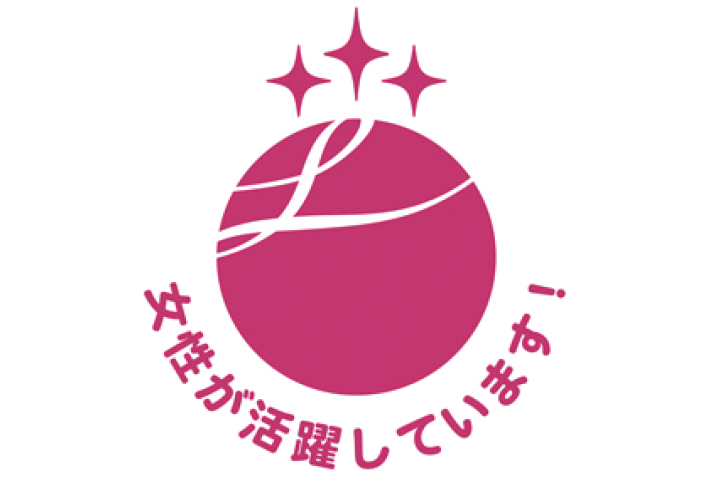
Ministry of Health, Labour and Welfare
Eruboshi certification of corporate excellence in the promotion of women’s active participation
Certification level 3
Acquired Platinum Kurumin Certification as a Company Supporting Childcare
In 2012, NGK was certified as a Childcare Support Company based on the Act on Advancement of Measures to Support Raising Next-Generation Children. In 2023, we acquired Platinum Kurumin certification for being a superior Childcare Support Company that is carrying out initiatives at a high level.
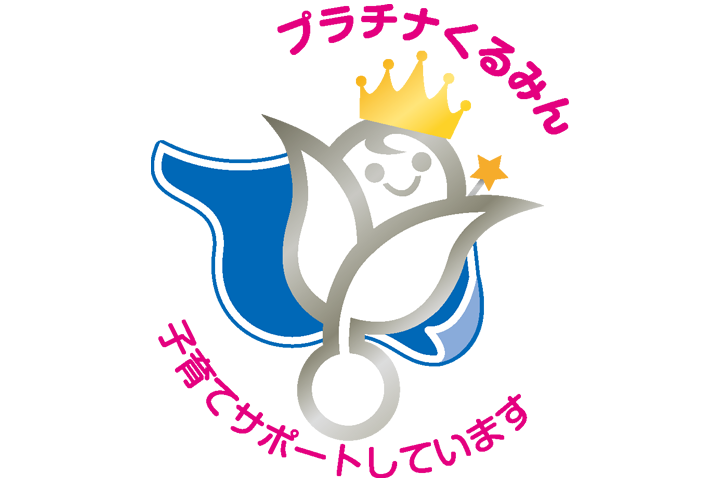
Ministry of Health, Labour and Welfare
Next-generation support certification logo
Platinum Kurumin
Selected by METI and the Tokyo Stock Exchange as Next Nadeshiko: Companies Supporting Dual-career and Co-parenting
In FY2024, for the second time, NGK was selected by the Ministry of Economy, Trade and Industry (METI) and the Tokyo Stock Exchange as one of the Next Nadeshiko: Companies Supporting Dual-career and Co-parenting which was newly established in FY2023. Companies are selected for being particularly outstanding based on their efforts to support both men and women in striking a balance between empowerment in the workplace and child rearing (i.e. dual-career and co-parenting).
Since NGK expanded our work-life balance support systems in step with the revision of the Child Care and Family Care Leave Act in 2009, we have continued to promote the creation of an environment in which everyone can work comfortably and improve their work-life balance. This includes enabling women to remain employed and actively participate in the workplace, and encouraging male participation in childcare. The participation of men in childcare is directly linked to promoting the active participation of women in the workforce. NGK recognizes that this is essential for creating a workplace that respects the diversity we aim for—where a variety of people can play an active role, and where everyone is recognized and respected. So we are working to support this. Going forward, we will continue to create an employment environment in which all employees can fully demonstrate their abilities.
